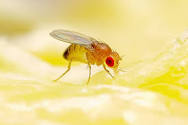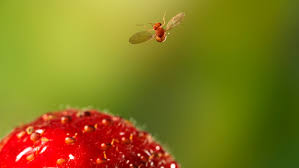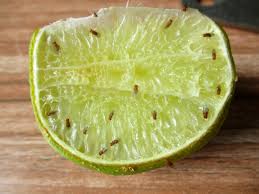I was praying in my living room a few mornings ago, sitting comfortably in my chair with my journal on my lap, when all of a sudden out of nowhere a lone fruit fly showed up. “Where in the heck did you come from?” I asked incredulously. He (or she) hovered over my hand for a brief moment and then disappeared, causing me to ask, “Where in the heck did you go?” Ordinarily I expect to see fruit flies in the heat of summer. But January?
This fruit fly’s appearance aroused my curiosity. So later, I did a little research. After all, even the lowly fruit fly is a part of God’s vast creation and deserves attention. But when I searched “fruit flies” on the internet, these headings came up: removal, home remedies, traps. It was easy to see that fruit flies are viewed primarily as pests. But I knew fruit flies had to be more than pests, so I continued reading about them and learned some fascinating things. (I hope you find these fascinating too.)

But before I get to those, let me tell you what you should do if you have a fruit fly “problem.” I’ll be brief. When you bring fresh fruit into your home, you’re probably bringing in fruit flies too. Most likely, your fruit already has fruit fly eggs on it. So the best thing to do is wash your fruit carefully, even using a small brush if possible. Then keep your fruit in an air tight container or refrigerator. WikiHow gives several ways to get rid of fruit flies. 1) Put out a small dish of apple cider vinegar. It’s a trap for them. 2) Make a sticky swatter by coating a paper/styrofoam plate in cooking oil, let it dry a bit, and then swat away. The flies will stick to the oil. I’ll spare you the details of other methods. One involves burning incense, another a blow dryer.

Now to the some fascinating facts about fruit flies. Fruit flies belong to the drosophila melanogaster family of insects. This family has over 4,000 different species! Since the 20th Century they have often been used in scientific research. Why? First, they are cheap to raise. Obviously, fruit flies don’t eat much and they don’t require a lot of space. Second, fruit flies proliferate very quickly. (That raises the question: Do fruit flies have more fun?) Fruit flies mature rapidly too, going from an embryo to an adult in just two weeks! This enables researchers to study multiple generations in a short time.
Sometimes scientists need to tell fruit flies apart for their research. Ordinarily fruit flies have red eyes. But one researcher bred a mutant strain with white eyes so he could tell which fruit flies were his. Another researcher needed virgin females for his experiments. This entailed careful examination of his fruit flies—first to separate the females from the males. How do you examine such teeny weeny creatures? By anesthetizing them and very gently examining them under a powerful microscope—using a tiny feather!

Other fun facts: 1) Fruit flies don’t actually eat fruit. They are attracted to the fermenting fungus or rot on overly ripe fruit. 2) Fruit flies live fast and hard. Their life span is 30-50 days. During that time, the female fruit fly can lay 500-2,000 eggs! 3) Fruit flies are “the stars of genetic research.” What we have learned from fruit flies in 30 years, would have taken us 200 years with mice. Fruit flies are more like us humans than we might imagine. Humans have 24,000 genes; fruit flies have 14,000! 4) The brain of the fruit fly has 100,000 neurons that can direct complex behaviors like sleep, courtship, learning, memory, aggression, grooming, and flight navigation. 5) Fruit flies are like us in other ways. They prefer beers with a fruitier base yeast just as humans prefer. And, if a male fruit fly has been sexually rejected, he often drowns his sorrow in alcohol.
We humans owe much gratitude to the humble fruit fly. Scientific research involving fruit flies have led to six Nobel prizes in Physiology and Medicine. Such research has shed light on genetics, embryonic development, immune disorders, and a whole host of diseases. As one researcher put it: “The fruit fly’s contributions to science are multitudinous!”

For reflection:
Did you learn anything new about fruit flies? What stands out for you?
Did you learn anything about the Creator of fruit flies? If so, what?
Our song today is the old hymn “How Great Thou Art.” This is Susan Boyle’s version of the refrain with beautiful photos chosen by Giula Zarantonello. When we sing this hymn, we often visualize mountains and oceans and stars and galaxies. But we must remember, God’s greatness is shown not only in the humongous, but also in the wee… like the fruit fly!
I invite you to add a comment below! We (my readers and I) love hearing from you!







16 Responses
Good morning, Sr. Melannie…
The fruit fly! Who knew? Wow! 4,000 different species. How many microscopes did it take for them to reach that number? And then there are the men and women who figured out, “Hey, these little buggers (no pun) can help humans.” I have to admit, though, my wife and I wage war against the lowly fruit fly. In fact, I think I saw one about ten minutes ago, and I think I know its launch pad: either from a banana that should have been eaten yesterday or a lemon sliced in half and left on the counter for the past two days. Time to break out the apple cider vinegar!
John, My reaction to this new knowledge about fruit flies was “Wow! too. We can appreciate this aspect of God’s creation without wanting hundreds of them living in our kitchen! Thanks again for your faithful responses to my blog! Melannie
Please place me back on email list! I miss my Monday morning Sr. Melannie fix!!
Rebecca it’s easy to just google search Melanie Svoboda sunflower seeds….
This was a flash back memory for me, genetics class in college. We performed our very own studies with fruit flies.
Thanks for the memories.
Have a blessed day.
Susan, Glad I could provide you with some memories! What we learned in college, we can appreciate again years later, not so? Thanks again! Melannie
I’m so happy to read your blog this morning! I used to receive them every week but no longer do😔 When I tried to resubscribe, the system said my email is already on the list? What should I do? Thanks ahead of time for your reply.
Cathy, Thank you for your continued interest in my blog. See Linda Marie’s comment to Rebecca above for a helpful suggestion. Thank you! Melannie
Sister Melanie, thank you for another interesting and informative post. It’s always fun to learn something new.
As so many others, I no longer automatically receive your posts. I read them on my phone in the Safari app. What I have done is pull your site up and LEAVE it in Safari. When I open my app, it’s already there and just needs to update every Monday. I close out all the searches at the end of the day except for yours. It serves as a reminder when I open it to search. Also, I have medicine I only take on Mondays, so there are two to-dos for me on Monday-medicine for my body and your site for my soul! Thank you!
Celeste, Thank you for your helpful suggestion for my readers who are no longer receiving my blog through their email. I had to smile at your words: “there are two to-dos for me on Monday: medicine for my body and your site for my soul.” Thanks for your encouraging words! Melannie
For those of you no longer getting Sunflower Seeds in your email, (myself included) I found a “fix” which may make it easier to access. Go to Sister’s website for Sunflower Seeds. Click on the 3 dots in the upper right hand corner. A drop down menu should appear, with a listing to add to home screen. Click on that and follow the prompt. This should create an icon which you can put on your device and by clicking on it, it brings up Sunflower Seeds! I just got a new tablet and the icon I had did not transfer, so I had to do it again and I paid attention to the process so I could pass the information on. Hope this helps in making it easier to get Sister’s reflections until she can get it fixed! And thank you Sister Melannie for your wonderful thoughts every Monday, even though I’m sometimes reading them on Friday! Blessings everyone! Praying for your IT people!
Christine, Thanks for your suggestion too! And yes, let’s keep praying for our IT people! Melannie
These flies also like the dirt in plants when it’s damp. One suggestion was to cover the dirt with marbles. Raid on top of the dirt also works.
For those not getting Sunflower Seeds, follow Christine’s directions (you may have 3 lines instead of 3 dots) and click on “bookmarks” or do Ctrl D. It will save today’s blog, and then you can go to the right side of the page for older or newer writings by Sister.
Suzanne, Thank you for your creative suggestions about fruit flies and how to bookmark my blog! Melannie
My favorite part of your blog was you praying and sitting comfortably in you chair with your journal on your lap. 🙏peace be with you.
I was impressed with the greatest of God shown in such a tiny fly! So all creatures large and small PRAISE the Lord!